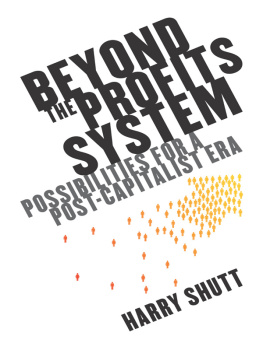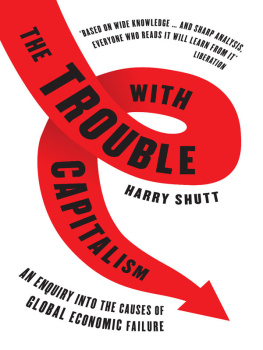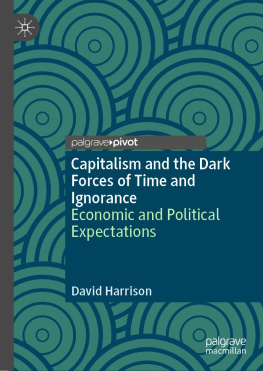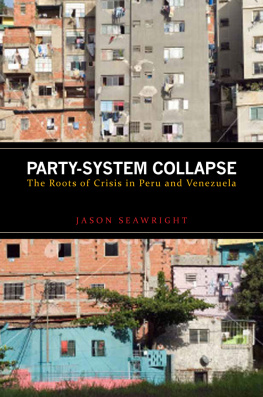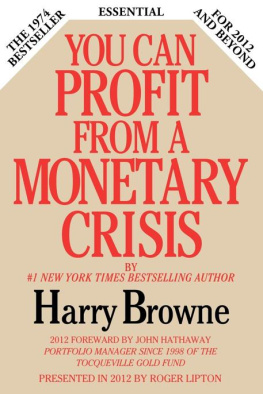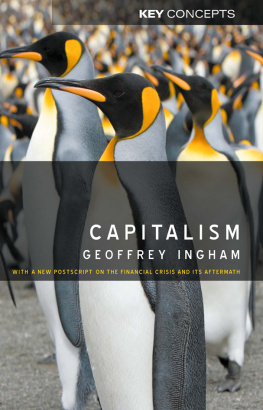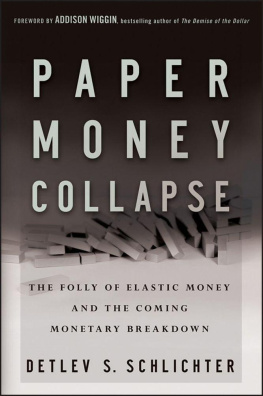
About the author
HARRY SHUTT was educated at Oxford and Warwick universities. He worked for six years in the development and planning division of the Economist Intelligence Unit (EIU). He then moved to the research department of the General and Municipal Workers Union (197376), and subsequently became chief economist at the Fund for Research and Investment for the Development of Africa (197779). Since then he has been an independent economic consultant. His books include The Myth of Free Trade: Patterns of Protectionism Since 1945 (1985), The Trouble with Capitalism: An Inquiry into the Causes of Global Economic Failure (1998), A New Democracy: Alternatives to a Bankrupt World Order (2001) and The Decline of Capitalism: Can a Self-Regulated Profits System Survive? (2005).
Also available from Zed Books
The Trouble with Capitalism: An Inquiry into the Causes of GlobalEconomic Failure
A New Democracy: Alternatives to a Bankrupt World Order
The Decline of Capitalism: Can a Self-Regulated Profits SystemSurvive?
Beyond the profits system
Possibilities for a post-capitalist era
___________
HARRY SHUTT

Zed Books
LONDON & NEW YORK
Beyond the Profits System: Possibilities for a Post-capitalist Era was first published in 2010 by Zed Books Ltd, 7 Cynthia Street, London N1 9JF, UK and Room 400, 175 Fifth Avenue, New York, NY 10010, USA
This ebook edition was first published in 2013
www.zedbooks.co.uk
Copyright Harry Shutt 2010
The right of Harry Shutt to be identified as the author of this work has been asserted by him in accordance with the Copyright, Designs and Patents Act, 1988
Designed and typeset in Monotype Jansen by illuminati, Grosmont
Cover designed by Rogue Four Design
All rights reserved. No part of this publication may be reproduced, stored in a retrieval system or transmitted in any form or by any means, electronic, mechanical, photocopying or otherwise, without the prior permission of Zed Books Ltd.
A catalogue record for this book is available from the British Library
Library of Congress Cataloging in Publication Data available
ISBN 978 1 84813 828 5
Introduction
T WO YEARS on from the start of the credit crunch which has precipitated the sharpest fall in global economic activity since the 1930s, a striking air of unreality pervades public discussion of the appropriate response to it. Thus most mainstream economists focus on the merits of rival policy prescriptions giving greater or lesser weight to different forms of fiscal or monetary stimulus (including some which would until recently have been dismissed as a recipe for disaster) while often conceding that they have no idea whether or when their proposed remedies will succeed in restoring equilibrium. What all have in common, however, is a professed belief that sooner or later recovery will somehow occur and that the capitalist system based on the pursuit of private profit maximisation will be restored to health.
Such apparent complacency is in striking contrast to the position that prevailed in comparable circumstances in the 1930s. At that time the global devastation which stemmed from the Wall Street Crash of 1929 led many to look to the Communist model of the newly established Soviet Union as a more rational alternative to the catastrophically failed model of Western capitalism. For there was no denying Soviet success in maintaining expansion and full employment in the 1930s in isolation from the paralysed economies of the West even if few were then aware of the horrific human cost that was also involved.
Now, some eighty years later, in the midst of a comparable economic upheaval, there is no sign of any alternative model being proposed by any political movement or pressure group of significance in the industrialised world. Following the collapse of the Soviet system at the end of the 1980s nearly all the worlds Communist and former Communist countries, including China, have effectively been drawn into the orbit of the global capitalist economy, with which they seem destined to sink or swim. Elsewhere the deprived masses of the Third World are variously subjected to obscurantist calls for a return to Islamic fundamentalist values or to long discredited Maoist slogans, while seemingly more coherent models of development adopted by Venezuela and other Latin American countries face the unremitting hostility of the free-market ideologues in Washington and consequent marginalisation by the international community of aid donors.
Hence it may be said that there now exists a glaring ideological vacuum in a world whose leaders still insist that, as proclaimed by British prime minister Margaret Thatcher in the 1980s, there is no alternative to the model of liberalised market capitalism which has held global sway for the last thirty years. Indeed it is a remarkable and seemingly inexplicable fact that what we may term the global establishment has succeeded in maintaining such uniform political commitment to this model for so long. For there have been many signs over the years of increasing fragility in the global financial and economic order including the world-wide stock-market crashes of 1987 and 2000 and a number of localised crises affecting Mexico, East Asia and Russia in the 1990s as well as mounting symptoms of social distress and consequent discontent and disorder across the world.
Whatever the reason for the failure of any serious opposition to this manifestly flawed ideology to appear based on a reasoned alternative the time is long overdue for a broad and open public debate on the kind of radically different model that is desperately needed. It is with a view to contributing to such a debate that the present work has been written. Its purpose may be summarised as twofold:
to demonstrate why present official policies intended to promote early revival of the global economy are bound to fail and why no model dependent on perpetuating growth and the maximisation of private profit can be sustainable in future;
to outline the principles on which a more economically stable and socially tolerable order could be based.
Readers may be struck by the fact that much of the analysis and ideas set out in the book are far from new and indeed have a pedigree dating from the early days of the Industrial Revolution in the nineteenth century. In fact, the continuing relevance of the critique of Marx, Engels, Carlyle, Ruskin, Morris and others of the ideology of industrial capitalism from a sociological, cultural and even moral perspective as well as an economic one may be seen as a powerful testament both to the systems enduring destructiveness and to the tenacity of its supporters in resisting all attempts to tame it. The clear lesson is that it will be no mean task to overcome the entrenched forces of resistance to fundamental change.
If the circumstances of the present crisis nevertheless give hope that it may now be possible to envisage an early transition to a less dysfunctional economic and social order, it is because:
1. the inherent tension between the need for the capitalist economy to generate an ever greater level of profit for investors and the need for the rest of society to appropriate a large enough share of value-added gross domestic product (GDP) in order to meet the basic needs of the wider public for adequate income and public services (and other socially desirable purposes) has now reached a political breaking point;
2. technological change has rendered capitalism obsolete, given that the need to assemble large amounts of investment capital in order to meet the demands of the new mechanical age ushered in some two hundred years ago by the development of steam power (which, as Marx and Engels pointed out, made necessary the transition from feudalism to capitalism) has now disappeared as the digital age heralds an end to societys need for such large-scale capital investment and hence for the profits demanded by private investors.
Next page
